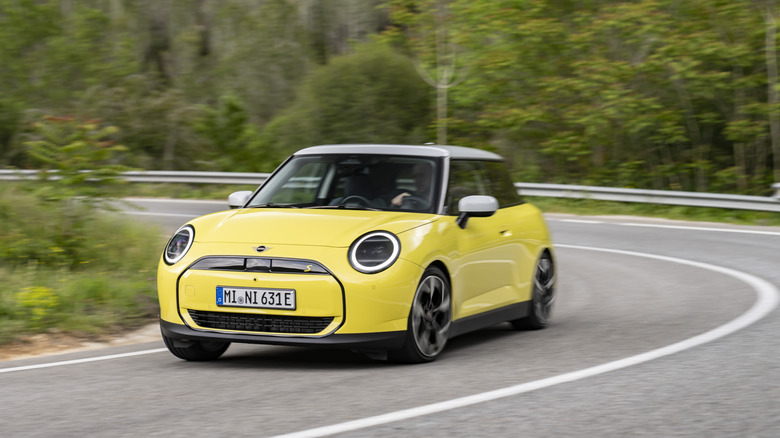Next-Generation Mini EVs Might Be Rear-Wheel Drive
As Mini's parent company BMW moves closer to unveiling production versions of its Neue Klasse, the name for its next generation of electric vehicles, it's becoming clear that single-motor cars on this platform can only be rear-wheel drive. The new electric Mini Cooper and Mini Aceman are front-wheel-drive, but they're built on a unique platform that was developed in partnership with Chinese automaker Great Wall Motor. Those Chinese origins and the impending tariffs on imported goods are the reason neither model is currently planned to reach the U.S. market. The next generation of electric Minis, however, are expected to be built on BMW's Neue Klasse platform, which means they're likely to be rear-wheel drive.
BMW claims its new Gen6 EV architecture will be a huge leap forward compared to the technology in its current EVs, with increases in range and charging speeds while reducing cost. The first model built on this platform will be a new electric SU that's expected to be revealed in the fall, but BMW will implement versions of the platform with each of its brands, including Mini and Rolls-Royce.
Where's the proof?
That means future Mini models using the Neue Klasse platform and technology will be rear-wheel drive for the first time in the company's history, as Autocar reports:
The configurability of the new platform means single-motor cars can only be had with the powertrain on the rear axle. This is because the main electrically excited synchronous motor (EESM) is the only one offered by the BMW Group with an integrated gearbox, and this sits exclusively between the rear wheels.
BMW Group engineers told Autocar at the launch of the platform that there are currently no plans to develop an EESM for use on the front axle and only the new small asynchronous motor (ASM) – which doesn't house a gearbox – will be fitted at the front. BMW models have long been developed with a rear-drive focus.
Don't despair, the fun will still be there
Fortunately, a purchasing and supply board member told Autocar that all future Minis will "always have Mininess," and that sheer driving pleasure will remain a priority for the brand. Mini Coopers have always been front-wheel drive, ever since the first Austin Mini revolutionized the automotive world in 1959. (Well, aside from modern Minis like the Countryman that have optional all-wheel drive.) The original Morris Mini Minor was a pioneer of space-efficient packaging thanks to a unique transverse-mounted, front-engine, front-wheel-drive layout that also packaged the transmission under the engine. This allowed virtually every inch of the car behind the engine to be used for passenger space, making it surprisingly spacious.
The introduction of a rear-wheel-drive Mini model would be groundbreaking, and driving enthusiasts know that this powertrain layout offers its own fun characteristics. Mini loves to claim its cars have a "go-kart feel," and though this claim is slightly hyperbolic, it's still palpable. Minis have uniquely darty, agile, and eager driving characteristics that are reminiscent of the laser-quick responses of a go-kart, but no road-legal production cars can provide the exact experience of driving a go-kart. Mini's product lineup just received a massive overhaul, so it's not clear when any next-generation models will be released, but as long as Minis stay fun, then they stay Minis, and a rear-wheel-drive Mini sounds like a hoot and a half.
